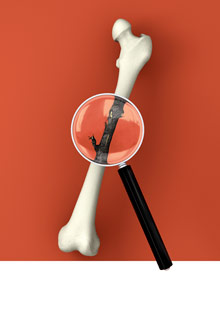Know Your Bones: How to Spot Osteoporosis Symptoms

Illustration: Bryan Christie Design
Thanks to milk ads and Sally Field, most women are aware of the dangers of osteoporosis. But bone density scans—our only tool for detecting the disease—are far from perfect. While they can spot the extremely porous bones that are a hallmark of severe osteoporosis, the scans aren't much help in identifying fracture risk in people with borderline osteoporosis, a group that accounts for about half of the 1.5 million annual osteoporosis-related fractures in the United States.
That's why the World Health Organization developed the online calculator FRAX (it stands for "fracture risk assessment"). It was introduced in the U.S. earlier this year. On the site, you plug in your score from a bone density scan along with your age; parental and personal history of fractures, weight, smoking and drinking habits; and whether or not you suffer from rheumatoid arthritis or use glucocorticoids (usually prescribed for asthma and other inflammatory diseases). For someone with osteopenia (borderline osteoporosis), many of these factors can triple the risk of fracture.
"Scans measure the amount of mineral in bone, but they can't tell you whether you have thinning in specific areas or whether you're prone to falling," says Bess Dawson-Hughes, MD, director of the Bone Metabolism Laboratory at the Jean Mayer USDA Human Nutrition Research Center on Aging at Tufts University. "This tool will help identify the women and men who need bone-protecting medications and the ones who don't."
Experts recommend that women begin getting bone density scans at age 65, but if you have any of the other risk factors, you may need to be tested earlier. (Dawson-Hughes suggests checking with your doctor.) At the very least, women at increased risk should be extra-vigilant about getting enough calcium (1,000 to 1,200 milligrams daily) and do weight-bearing exercise to strengthen bones.
You can ask your doctor to run your latest bone density scan results through FRAX, or do it yourself at www.shef.ac.uk/FRAX. It's almost as easy as checking your bank balance online.
That's why the World Health Organization developed the online calculator FRAX (it stands for "fracture risk assessment"). It was introduced in the U.S. earlier this year. On the site, you plug in your score from a bone density scan along with your age; parental and personal history of fractures, weight, smoking and drinking habits; and whether or not you suffer from rheumatoid arthritis or use glucocorticoids (usually prescribed for asthma and other inflammatory diseases). For someone with osteopenia (borderline osteoporosis), many of these factors can triple the risk of fracture.
"Scans measure the amount of mineral in bone, but they can't tell you whether you have thinning in specific areas or whether you're prone to falling," says Bess Dawson-Hughes, MD, director of the Bone Metabolism Laboratory at the Jean Mayer USDA Human Nutrition Research Center on Aging at Tufts University. "This tool will help identify the women and men who need bone-protecting medications and the ones who don't."
Experts recommend that women begin getting bone density scans at age 65, but if you have any of the other risk factors, you may need to be tested earlier. (Dawson-Hughes suggests checking with your doctor.) At the very least, women at increased risk should be extra-vigilant about getting enough calcium (1,000 to 1,200 milligrams daily) and do weight-bearing exercise to strengthen bones.
You can ask your doctor to run your latest bone density scan results through FRAX, or do it yourself at www.shef.ac.uk/FRAX. It's almost as easy as checking your bank balance online.
As a reminder, always consult your doctor for medical advice and treatment before starting any program.



